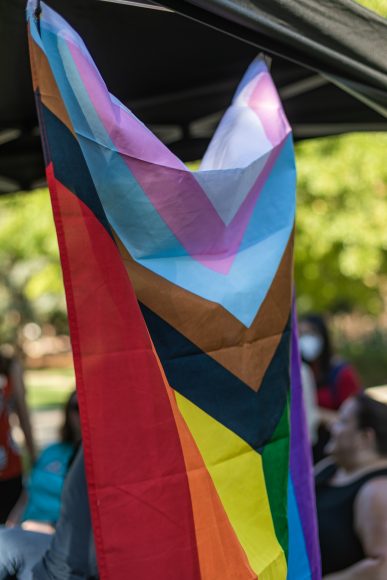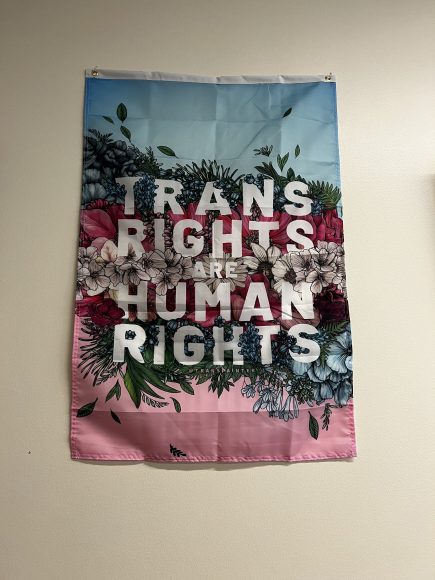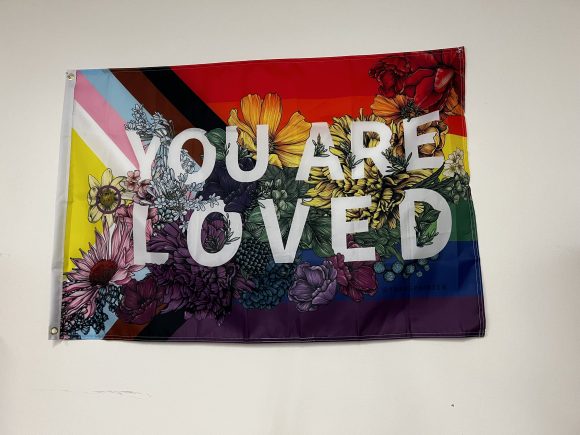
A pride flag hung from a Center for Inclusion and Social Change tent during the Pride Picnic on Tuesday, Aug 30, 2022. (Io Hartman/CU Independent)
Colorado has had a long, often complex history with the LGBTQ+ community, marked by triumphs such as the legal protection of transgender healthcare in April, as well as tragedies such as the Club Q shooting that occurred in 2022 in Colorado Springs.
“Colorado is in a good spot. We have refused that [anti-transgender] legislation. We also currently serve as a kind of sanctuary state for LGBTQ folks,” said Morgan Seamont, the director of the University of Colorado Boulder’s Pride Office. “We’ve actually had students call us and be like, ‘I need to move out of my state. How do I get into CU Boulder?’”
As Colorado’s flagship higher-education institution, CU Boulder has, in general, historically supported the LGBTQ+ community.
“We have a ton of policies across campus that protect our LGBTQ populations,” Seamont said. “Anywhere from student health insurance, that covers trans-related care, or LGBT care for that matter, to a human specialist over in Counseling and Psychiatric Services (CAPS) that specializes in LGBTQ+ issues.”
The university’s support of the LGBTQ+ community is important to students as the national social climate has grown increasingly hostile, specifically concerning the transgender community.

Banner supporting transgender rights hangs in the University of Colorado Boulder’s Pride Office located in the Center for Community. (Jessi Sachs/CU Independent)
“The school tries to do a pretty good job of accepting their LGBT students, especially recently as rights have been threatened,” said Miranda Kolb, a student at CU Boulder who identifies as a bisexual woman.
Much of the university’s support of the LGBTQ+ community comes from the Pride Office, an office of the Center for Inclusion and Social Change that focuses on supporting LGBTQ+ students.
“We are a population that does have unique needs, and we need spaces where we can gather and feel safe,” Seamont said. “Where we can explore our identities, talk openly about sexuality and gender identities… and what particular challenges we face as a community.”
The Pride Office primarily achieves this goal through community building.
“A lot of our work centers on making sure people don’t feel isolated,” Seamont said.
CU Boulder’s outward support of the LGBTQ+ community factors into many students’ decision to attend the university.
“I was exclusively looking at non-religious LGBT friendly colleges because I just really didn’t want the troubles of really dealing with homophobia or other things like that,” Kolb said, speaking on the university’s reputation. “So it was definitely a huge factor.”

Banner supporting LGBTQ+ students hangs in the University of Colorado Boulder’s Pride Office located in the Center for Community. (Jessi Sachs/CU Independent)
Despite the Pride Office’s work and CU Boulder’s status as a Campus Pride and Best Colleges top 40 university for LGBTQ+ students, there are a number of challenges facing the community at CU Boulder.
“When we took a look at some campus climate data, it’s clear that LGBTQ+ students are not graduating at the same rate as their straight and cisgender peers,” Seamont said.
According to Seamont, 24% of LGBTQ+ undergraduate students left the university prior to completing their degree from 2014 to 2017, compared to 18% of non-LGBTQ+ undergraduate students.
The challenges faced by the LGBTQ+ community at the university also extend beyond students.
Despite its social and political reputation as an LGBTQ+ friendly city within a largely LGBTQ+ friendly state, the city of Boulder has its own shortcomings for LGBTQ+ residents.
“We know that our queer and/or trans faculty have also struggled to stay at the university because there isn’t necessarily a lot of support in Boulder itself,” Seamont said. “There’s no gay bar. There’s not a lot of social life.”
These challenges are both issues that the Pride Office hopes to address in the coming future.
“We’re encouraging community building amongst that community as well,” Seamont said, referring to university faculty. “Then, of course, for our undergraduate students, we will continue to hold [community-building events].”
Contact CU Independent News Editor Jessi Sachs at jessica.sachs@colorado.edu.
